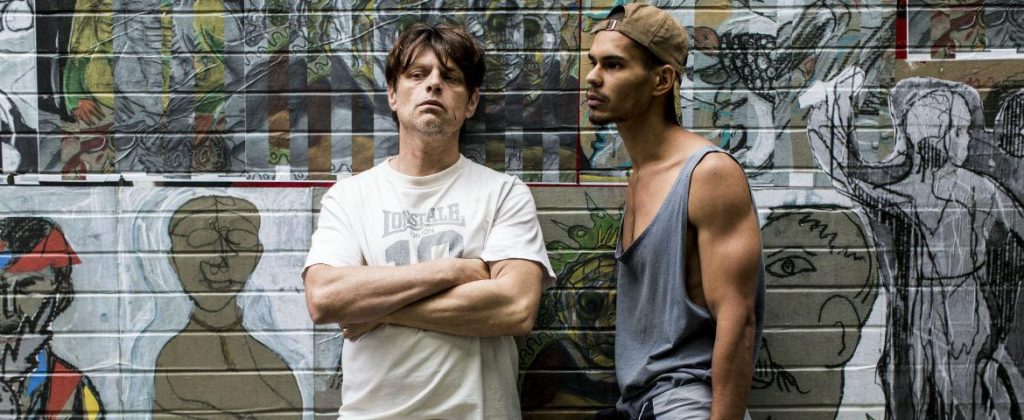Pawno is a film that announces the very welcome arrival of a pair of new voices in Australian cinema – Paul Ireland and Damian Hill. Ireland and Hill are seasoned actors, but for the first time they direct and write here. This varied acting experience helps influence the casting of the film with a veritable who’s who of upcoming and established Australian talent – everyone from the must-watch Mark Coles Smith through to luminescent Maeve Dermody and finally, the core role of the film, John Brumpton, are brilliant in their roles.
I’m getting ahead of myself though as really, one needs to touch on the ‘plot’ of Pawno before jumping into why it’s one of the best Australian films of 2016. Pawno is less about telling a three act structured narrative, and more about exhibiting a slice of Australian life as faithful to real life as possible. Set in Footscray, Melbourne, this is a film that can easily sit alongside the great Death in Brunswick as being a perfect exhibition of what Australian life is like. As anyone who has strolled through Footscray – or really, any outer Melbourne suburb – would tell you, there is a great mixture of cultures and personalities within these suburbs. They exist as microcosms of society where everyone (almost) peacefully co-exists in a beautiful manner. Here, a recovering drug addict can buy lunch from a local Asian restaurant even though he’s a few dollars short.
Pawno is less concerned with telling a story that follows a lead character and their exploits; this is more a film that is interested in delivering realistic, relatable characters within a very real world environment. John Brumpton’s pawn shop store owner, Les Underwood, works as a pseudo-conduit for the story, with almost every character coming in contact with him or his store in some way. It’s through the curtain-covered windows of this pawn shop that we see the world of Footscray. In today’s eBay driven second-hand environment, the continual existence of a pawn shop in the suburbs seems odd, or almost even quaint. Yet, each character who visits the pawn shop feels genuine – whether it’s Les’ friend Harry (Tony Rickards) using the pawn shop as a place to listen to the days horse races on the radio, or Maeve Dermody’s Kate who visits to get her glasses repaired, there is a great communal environment created within the pawn shop.
The world outside the pawn shop is given great coverage through vignettes that showcase each characters day. Some flitter onto the canvas briefly, but through great writing and relatable scenarios, they remain memorable beings. Take Mark Silveira’s Harsha for example – newly emigrated from India, Harsha is looking to start a new life in Australia for his family, he’s portrayed with such affection from Silveira that you understand his motivations and desires. Even though Harsha is on screen for well under five minutes, he is a sympathetic character who feels like he continues on beyond the frames of the film he exists in. The aggressive Jason Spears (Brad McMurray) who demands a certain price for a watch and is denied, is given context for his aggression, making him sympathetic. Not that every character needs to be sympathetic – instead, their actions are provided enough context to be able to sympathise with them, no matter how harsh a character they may initially seem.
Together, Paul Ireland and Damian Hill have created a film that feels very much like a ‘down under’ Richard Linklater film. It may take a good half hour to get into the groove of what Pawno is aiming for, but once you’ve spent time with these characters and the world of Footscray and the last ‘act’ rolls around, you’ll be hard pressed to not be moved by it. Australian films often get a hard rap for being too depressing or dour (something I don’t entirely agree with), so with that in mind, it’s truly wonderful to see that Pawno takes elements of real life (such as drug addiction or marriage breakdowns) and makes them watchable. Not only watchable, but turns these into an extremely enjoyable watch. These are characters who feel as if they’ve been pulled directly from (not only) the streets of Footscray, but the streets of any city in Australia.
Often the ‘thugs’ or ‘druggies’ of the world are seen as just that, rather than the humans they actually are. While these may not always be likable people, Pawno presents them as people who aspire for things greater than what they are, or if not aspire for greater things, but have love and care for a family or their significant other. Whether it be a dog named Ruby or kids at a dining table, or in one all too real character arc, Kerry Armstrong’s mother searching for her wayward son, these are characters who have a belonging to the world around them. On paper, they could be perceived as stereotypes, but Hill’s writing helps break them out of their molds. Under less assured hands, they would simply become caricatures, cheapening the film.
Finally, it would be remiss of me to not mention the fantastic use of Australian music here. Pawno opens with a great blend of Australian and Cambodian music with Astronomy Class’ Four Barang in a Tuktuk from the 2014 Mekong Delta Sunrise – a song which is an apt representation of Australian multicultural society. Later on, a young girl busking sings with a ukulele Vance Joy’s perennial ballad Rip Tide – her appearances throughout the film are great notes of Australian music buoying the characters of the film.
For a ninety minute film, Pawno is a true accomplishment of Australian cinema, one that needs to be celebrated for delivering enjoyable characters. Pawno is funny, it’s heart breaking, it’s a slice of Australian culture that everyone can relate to in some shape or form. I’m glad that (in WA at least) it has a wide country release, as this feels like a film that would travel wonderfully in towns where pawn shops are still highly active. Even then, this is a film that deserves a wide audience. Get along to see it while you can, you won’t be disappointed. (Or, if you’re reading this when it’s out on a streaming service or on DVD, then set aside the time to watch this great little film. At the least, you’ll fall in love with one of the characters – for me, I couldn’t get enough of Mark Coles Smith’s Pauly and his pal Carlo as played by Malcolm Kennard.)
Writer: Damian Hill
Cast: John Brumpton, Maeve Dermody, Mark Coles Smith



